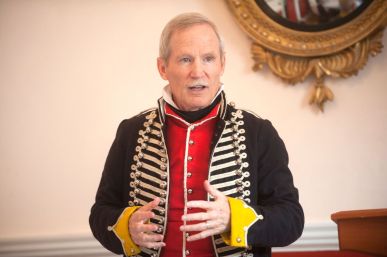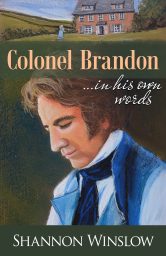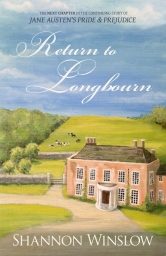 Today my humble little blog and I have the honor of hosting another author on blog tour. It’s Collins Hemingway with his new book, the second volume of an ambitious trilogy: The Marriage of Miss Jane Austen. With a title like that, you have to know I would be interested, right? In fact, it struck me that the title (if I had come up with it first) could have fit my own novel The Persuasion of Miss Jane Austen pretty well. So I was delighted to have the chance (through the magic of the internet) to sit down with Collins and talk about his writer’s journey and this trilogy. Here’s a short blurb about the books, followed by our Q&A.
Today my humble little blog and I have the honor of hosting another author on blog tour. It’s Collins Hemingway with his new book, the second volume of an ambitious trilogy: The Marriage of Miss Jane Austen. With a title like that, you have to know I would be interested, right? In fact, it struck me that the title (if I had come up with it first) could have fit my own novel The Persuasion of Miss Jane Austen pretty well. So I was delighted to have the chance (through the magic of the internet) to sit down with Collins and talk about his writer’s journey and this trilogy. Here’s a short blurb about the books, followed by our Q&A.
Jane Austen lived a solitary life of a writer … Or did she?
The Marriage of Miss Jane Austen tells a spirited, affecting love story during an exciting, turbulent time. Set in the “lost years” of her twenties – a period of which historians know virtually nothing – the trilogy reveals the story of a talented, passionate woman fully engaging with a man who is very much her equal. (Read more here)
 SW: Welcome, Collins, and thanks for joining me today. I was wondering, how did you get your start writing non-fiction and why did you make the transition into fiction? Did you find making the switch difficult?
SW: Welcome, Collins, and thanks for joining me today. I was wondering, how did you get your start writing non-fiction and why did you make the transition into fiction? Did you find making the switch difficult?
CH: My career began as a reporter and editor, so I began with short nonfiction. When I moved to the software industry, I wrote computer manuals and later business whitepapers and business plans. My software and writing background gave me the opportunity to write “Business @ the Speed of Thought,” a book about the use of technology in modern business, with Bill Gates at Microsoft. The success of that book led to opportunities to delve into difficult and interesting topics such as business ethics, the retail trade, and the workings of the brain.
 I actually wrote my first novel in 1984, long before I did my first book-length nonfiction, and through the years wrote two more novels. All of my early novels were set in contemporary times. None of these first three deserved to see the light of day, but they taught me the fiction craft. The nonfiction books have paid the rent while I pursued my love of fiction. I wrote Volume I of The Marriage of Miss Jane Austen around one nonfiction book on mobile technology and another on how the brain functions under stress.
I actually wrote my first novel in 1984, long before I did my first book-length nonfiction, and through the years wrote two more novels. All of my early novels were set in contemporary times. None of these first three deserved to see the light of day, but they taught me the fiction craft. The nonfiction books have paid the rent while I pursued my love of fiction. I wrote Volume I of The Marriage of Miss Jane Austen around one nonfiction book on mobile technology and another on how the brain functions under stress.
I wrote Volume II of the Austen trilogy without any digressions, and I plan to do the same to finish Volume III, which I plan to publish in late 2017.
Writing any difficult topic at book length, fiction or nonfiction, is good discipline. It’s like running a marathon over different courses. It’s never easy, but you gain strength and confidence with each one. Nonfiction is easier in that you have a topic with multiple points. You have to do the research, explore the implications, develop a conclusion–a point of view on what you learned. Fiction is much more open-ended. Characters have to act according to cause and effect—what they do to each other and how they treat each other–rather than what the author may prescribe. In an historical novel, you have to work in events in a believable way. You can’t just have history marching by as the characters watch. They have to have a reason to participate. You also have to fully develop the setting and background and flesh out the characters to make them real, not just stick figures moving the plot along.
SW: Not many men are drawn to Jane Austen. How did you discover her and why do you love her novels?
CH: I was hooked on Austen by an outstanding college professor who loved Austen, particularly “Emma.” My view at the age of 21 was that she was a brilliant but superficial writer. Her books, I believed, ended where they should have begun: with marriage, when the fun and flirtation must adapt to the realities of living day to day with a partner you don’t really know. I didn’t understand that social conventions prevented women authors of the time from directly tackling the substance of life. Even the Bronte sisters, writing a generation later, were able to tackle more “passionate” stories only by publishing under the names of men.
My professor told me that, as I grew older, I would see how Austen subtly wove real life and important issues into the fabric of her stories. He was right, of course. The more I saw what she was able to do with a very limited form, the more I was impressed.
I’m also an advocate of the underdog, and women have always been society’s underdogs. Especially in the early 1800s, when everything from the law to social norms to biology were against them. My attitude, I’m sure, comes from being the child of a single mother, who raised three boys by herself, when the social norms of the mid-20th Century limited her career choices to being a secretary.
As a writer, I admire how Austen rewrote ceaselessly to hone her scenes, characters, and dialogue. We don’t officially know how much revision she did, but no writer can read her work without understanding how many times it would take to evolve a decent phrase into a brilliant one. You don’t reach that level of perfection without painstaking thought and repeated recasting over many years. That’s my view, anyway.

Collins and his wife at the Jane Austen Festival in Bath
SW: What are your favorite Austen works and why?
CH: “Pride and Prejudice,” because Liz is the only female lead to unflinchingly go toe to toe with every antagonist–not just Darcy but Mr. Collins and Lady Catherine. “Emma” because of the plot ingenuity, the beauty of the writing, and the way Emma recognizes her true feelings for Mr. Knightley in a series of epiphanies. “Mansfield Park” because its cast of characters is more on the order of Trollope than anything Austen had done before. I also don’t consider Fanny to be the mousey goodie-two-shoes that many people do. “Persuasion” because passion finally bursts out of her characters despite all they can do to hold it back. Virginia Woolf said the novel proved that Austen had loved deeply and no longer cared who knew.
I believe “Sanditon” was going to be something radically different, too, though we have just the bare beginning. My one wish would have been for Austen to return to “Lady Susan” as a mature writer and flesh her out as the Whit Stillman’s movie does.
SW: You and I have both been inspired to write an alternate story line for Jane Austen – for me, in “The Persuasion of Miss Jane Austen,” an for you, in this trilogy. Where did the idea for your trilogy originate?
CH: Through the years, as I developed a love of this period–its history, literature, social issues, and technological developments–I kept my original thought in mind: What if Austen had written about life after courtship? What if she had been able to tell the story of “ordinary life” after marriage? As it really was, with all of its joys and challenges. That’s what motivated me, for as long as I can recall. When, years ago, I learned of the “missing” seven years of her life, of which very little is known, I knew I had an entrée not just to use an Austen-like protagonist of intelligence and character, but Austen herself. This period, 1802-1809, was when she was in her late 20s and early 30s, the “danger years” for a woman facing spinsterhood. This means I could tell the story of an adult woman, not a teenage girl. At the same time, a book called “The Age of Wonder” by Richard Holmes, gave me the insight into how to tell a story totally different from the village romance.
You, Shannon, wanted to give Austen the same happy ending that her major characters had, and took an intriguing approach. I was not so kind. I wanted to use her as an archetype for the life of the everywoman of 1800. I wanted to see how she would respond if she had had the opportunity to grapple with the most important personal and public issues of the day. I wanted to test her to see what she was made of. I also wanted the intellectual challenge of mapping the story to what is known of Austen in this period and to the major events of the day.

Collins speaking at book launch in Bath
SW: You’ve made some bold choices in debuting and promoting your books. Why did you decide to do your official book launch in Bath, England?
CH: I wanted to honor both Austen and her many readers who have understood her hidden depths as well as her subtlety and charm. The first section of Volume I is set in Bath. The book opens with a ball to introduce the characters, but this is something of a misdirection play. The book really opens with Chapter 3 and the demonstration of a fairly new technological innovation, a hot air balloon, that occurred historically in September 1802. This incident enabled me to set the protagonist on an entirely new path.
Finally, this actual writing project began ten years ago in my first visit to Bath, when I decided I wanted to tell a serious story of the life of Jane Austen as it might have been. Her life–if one or two critical decisions had gone another way. The launch brings me full circle.
SW: Thank you, Collins, for sharing your story with us! I always find it fascinating to talk to another author, especially one in my own genre, about his/her personal journey.
Collins is a graduate of the University of Arkansas, Phi Beta Kappa, with a major in English Literature and a minor in science. He has a master’s degree in English literature from the University of Oregon. He has several published works, both fiction and non-fiction.
I hope you enjoyed this interview. Do you have questions or comments for Collins? Please leave them below.














This was a fabulous interview. Thank you for sharing it with us. I love the photos too.
I have read and reviewed both of these books and I have to say Collins did an amazing job capturing the essence and tone of Jane Austen within a story that’s a fascinating read within own rights.
I hope more JAFF readers and lovers of Austen give this trilogy a try. It’s a beautiful story and I’m sure volume 3 will be a moving read as well.
You’re very welcome! Yes, I would like to see more JAFF readers expand their horizons beyond P&P. There’s so much else out there that’s every bit as worth reading!
Absolutely fascinating. He clearly has a deep and broad understanding and respect that shows through the answers to your thoughtful questions. Lovely interview! Thank you!
Glad you enjoyed it, Nicole!
Shannon, I very much appreciate your providing a forum for my trilogy–and for me as an author. Thanks for the time and energy you put into the interview and posting. Collins
You’re welcome, Collins. It was fun having you guest on my humble little blog. Best wishes for your continued success!